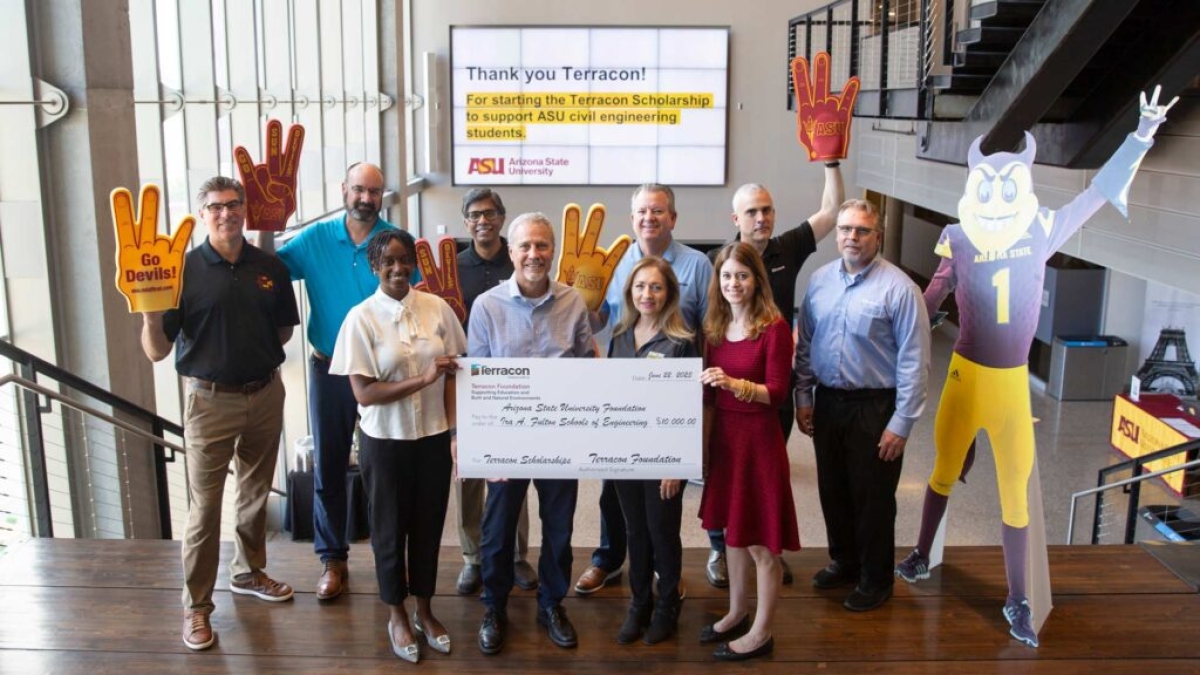Terracon Foundation scholarships empower future engineers

Members of Terracon, the Arizona State University Foundation and ASU Professor Ram Pendyala celebrate the awarding of the foundation's scholarships to support engineering students pursuing graduate or undergraduate degrees in civil, environmental and sustainable engineering. Photo by Erika Gronek/ASU
Engineering is a field that drives innovation and shapes our world. To help ensure the development and training of students who will build and support the communities of tomorrow, it is essential to invest in the education and development of Arizona State University’s future engineers.
The Terracon Foundation, the community investment branch of the employee-owned engineering consulting firm Terracon, is establishing a scholarship to support civil engineering students.
“Terracon is a leading company in the civil and geotechnical engineering domains undertaking complex infrastructure projects that benefit communities nationwide,” says Ram Pendyala, a professor of civil engineering and director of the School of Sustainable Engineering and the Built Environment, part of the Ira A. Fulton Schools of Engineering at ASU. “The company's commitment to advancing the workforce of the future is exemplified through their generous donation toward student scholarships. We are very grateful for the support and look forward to working together to grow an outstanding pipeline of talent that will serve the industry for years to come.”
Terracon's commitment to engineering education has been demonstrated through its involvement in various ASU organizations and initiatives, including the Friends of Civil and Environmental Engineering, or FOCE2, and the Arizona Pavements/Materials Conference. In addition, the firm recruits ASU students into its workforce, exemplifying its dedication to the Arizona engineering community.
“The true value lies in the unconditional support that Terracon and its employees provide for interns and students who are working on class projects necessary to complete their degree requirements,” says Kamil Kaloush, civil engineering program chair and professor in the School of Sustainable Engineering and the Built Environment. “They participate in our classes as guest lecturers, provide speakers for engineering seminars and support our engineering student organizations' chapters.”
The Terracon Foundation Scholarship provides financial support to engineering students pursuing graduate or undergraduate degrees in civil, environmental and sustainable engineering. While scholarships have always been an essential means of helping students overcome financial barriers to education, industry collaborations with companies like Terracon also create opportunities for students to gain professional experience and industry knowledge.
Terracon Executive Vice President Tim Anderson, who is a 1987 ASU alum, says the scholarships can provide valuable opportunities for students with a company that is one of the largest in the country, with more than 6,000 employees in 175 locations. The company is consistently ranked as a top 25 design firm by Engineering News-Record.
“We're the No. 1 employee-owned firm in geotechnical engineering in the U.S. and do a wide variety of engineering consultations,” Anderson says.
The company’s motivation for creating this scholarship is to increase the number of professionals in the field.
“We want to drive more people into engineering. We want to help increase the number of people in the pipeline not only for our firm but all engineering firms," Anderson says. "ASU is an excellent place for students to learn. It's a great location with great faculty. Just looking at the changes since I graduated, it's pretty impressive.”
Terracon’s scholarship program seeks to attract students who have specific interests in geotechnical and pavement engineering, two crucial disciplines that play a major role in shaping modern infrastructure.
“There is a real demand for geotechnical engineers,” says Brent Borchers, a regional manager at Terracon. “We are constantly looking for people to fill our geotechnical civil engineering roles because we don't have enough. It’s important for us to support quality engineers coming out of these programs at ASU.”
Meet the students
This year, three students with exceptional academic potential in the field of civil engineering are recipients of the Terracon Foundation Scholarship: Samuel Montano, Abby Noël and Aiden Vital.
Vital, a junior at ASU, says the scholarship will allow him to focus on his studies, take part in meaningful research projects and participate in activities that will enrich his learning experience.
“I was born and raised right here in Arizona and am very community-oriented,” Vital says. “So engineering at ASU was an easy choice for me.”
Noël, a sophomore in Barrett, The Honors College, says that the scholarship is an investment in her education, enabling her to focus on her studies and career.
“I look forward to continuing my studies in the fall to follow my pursuit of becoming a civil engineer who makes a difference in their community,” Noël says.
Montano, a student in the honors college, plans to use the scholarship to pursue his bachelor’s degree and graduate summa cum laude, saying the award motivates him to continue his education and take on more activities at ASU.
“I plan to become a professional engineer and eventually become a practice-builder where I lead projects for clients around the Valley,” Montano says.
Beyond scholarships, the company encourages its employees to request grants to support organizations focused on education as well as the built and natural environments. To date, the Terracon Foundation has awarded nearly $4 million in grants to community organizations, universities, dependents of employees and disaster relief efforts.
More Science and technology

Cracking the code of online computer science clubs
Experts believe that involvement in college clubs and organizations increases student retention and helps learners build valuable…
Consortium for Science, Policy & Outcomes celebrates 25 years
For Arizona State University's Consortium for Science, Policy & Outcomes (CSPO), recognizing the past is just as important as…

Hacking satellites to fix our oceans and shoot for the stars
By Preesha KumarFrom memory foam mattresses to the camera and GPS navigation on our phones, technology that was developed for…